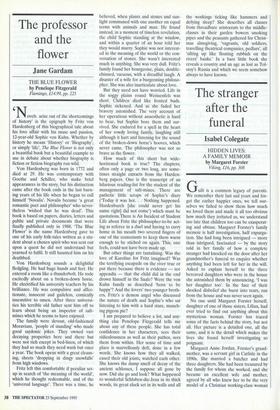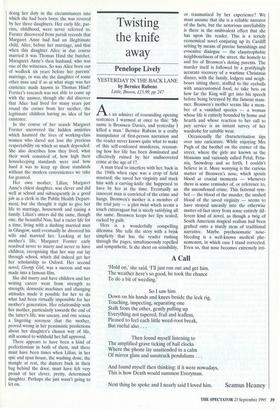The stranger after the funeral
Isabel Colegate
HIDDEN LIVES: A FAMILY MEMOIR by Margaret Forster Viking, £16, pp. 308 Guth is a common legacy of parents. We remember their last sad years and for- get the earlier happier ones, we tell our- selves we failed to show them how much we loved them and made it all too obvious how much they irritated us, we understand too late that children too can be exasperat- ing and obtuse. Margaret Forster's family memoir is half investigation, half expurga- tion. She had long been intrigued — more than intrigued, fascinated — by the story told in her family of how a complete stranger had knocked on the door after her grandmother's funeral to enquire whether anything had been left for her in the will. Asked to explain herself to the three bereaved daughters who were in the house she astonished them by announcing, 'I was her daughter too'. In the face of their shocked disbelief she burst into tears, ran from the house and was never seen again.
No one until Margaret Forster herself, daughter of one of those sisters, Lilian, had ever tried to find out anything about this mysterious woman. Forster has traced some of the facts behind the story, but not all. Her picture is a detailed one, all the same, and it is the detail which makes the lives she found herself investigating so poignant.
Margaret Anne Jordan, Forster's grand- mother, was a servant girl in Carlisle in the 1890s. She married a butcher and had three daughters. She had been treasured by the family for whom she worked, and she became an excellent wife and mother, agreed by all who knew her to be the very model of a Christian working-class woman doing her duty in the circumstances into which she had been born; she was revered by her three daughters. Her early life, par- ents, childhood, were never referred to. Forster discovered from parish records that Margaret Anne had. had an illegitimate child, Alice, before her marriage, and that when this daughter Alice in due course married it was Thomas Hind the butcher, Maragaret Anne's then husband, who was one of the witnesses. So was Alice born out of wedlock six years before her parents' marriage, or was she the daughter of some other man and if so at what stage was her existence made known to Thomas Hind? Forster's research was not able to come up with the answer, though she did discover that Alice had lived for many years just round the corner from her mother, the legitimate children having no idea of her existence.
In the course of her search Margaret Forster uncovered the hidden anxieties which haunted the lives of working-class women who dared not lose the precious respectability on which so much depended. She also describes how they lived, what their work consisted of, how high their housekeeping standards were and how hard it was to keep up those standards without the modern conveniences we take for granted.
Her own mother, Lilian, Margaret Anne's eldest daughter, was clever and did well at school and subsequently in a good job as a clerk in the Public Health Depart- ment, but she thought it right to give her life to marriage, housework and raising a family. Lilian's sisters did the same, though one, the beautiful Nan, had a racier life for a time, living with a dashing married man in Glasgow, until eventually he divorced his wife and married her. Looking at her mother's life, Margaret Forster early resolved never to marry and never to have children, recognising that her way out lay through school, which did indeed get her her scholarship to Oxford. Her second novel, Georg Girl, was a success and was made into a famous film.
She did marry and have children and her writing career went from strength to strength; domestic machines and changing attitudes made it possible for her to do what had been virtually impossible for her mother's generation. Her relationship with her mother, particularly towards the end of the latter's life, was uneasy, and one senses a lingering soreness that the mother, proved wrong in her pessimistic predictions about her daughter's chosen way of life, still seemed to withhold her full approval.
There appears to have been a kind of perfectionism in both of them, and there must have been times when Lilian, in her spic and span house, the washing done, the mangle at rest, the dusters back in their bag behind the door, must have felt very proud of her clever, pretty, determined daughter. Perhaps she just wasn't going to let on.



































































 Previous page
Previous page